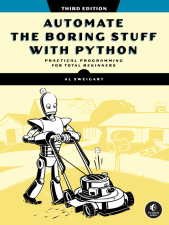
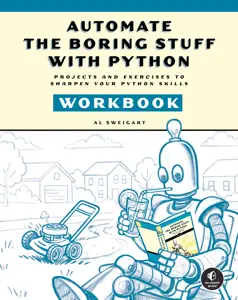
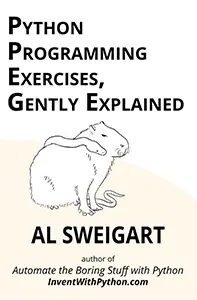
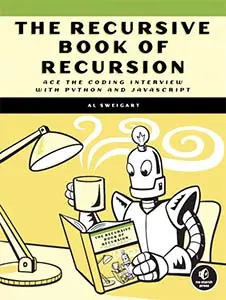
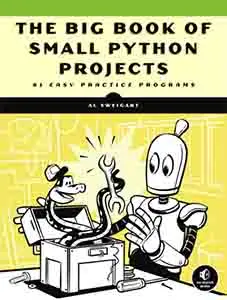
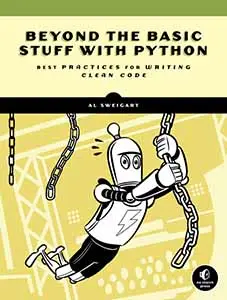
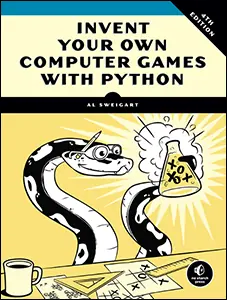
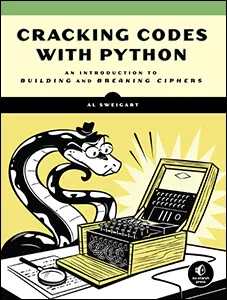

In this game, the player must hack a computer by guessing a seven-letter word used as the secret password. The computer’s memory banks display the possible words, and the player is given hints as to how close each guess was. For example, if the secret password is MONITOR but the player guessed CONTAIN, they are given the hint that two out of seven letters were correct, because both MONITOR and CONTAIN have the letter O and N as their second and third letter. This game is similar to Project 1, “Bagels,” and the hacking minigame in the Fallout series of video games.
When you run hacking.py, the output will look like this:
Hacking Minigame, by Al Sweigart [email protected]
Find the password in the computer's memory:
0x1150 $],>@|~~RESOLVE^ 0x1250 {>+)<!?CHICKEN,%
0x1160 }@%_-:;/$^(|<|!( 0x1260 .][})?#@#ADDRESS
0x1170 _;)][#?<&~$~+&}} 0x1270 ,#=)>{-;/DESPITE
0x1180 %[!]{REFUGEE@?~, 0x1280 }/.}!-DISPLAY%%/
0x1190 _[^%[@}^<_+{_@$~ 0x1290 =>>,:*%?_?@+{%#.
0x11a0 )?~/)+PENALTY?-= 0x12a0 >[,?*#IMPROVE@$/
--snip--
Enter password: (4 tries remaining)
> resolve
Access Denied (2/7 correct)
Enter password: (3 tries remaining)
> improve
A C C E S S G R A N T E DThis game has a hacking theme, but it doesn’t involve any actual computer hacking. If we’d just listed the possible words on the screen, the gameplay would have been identical. However, the cosmetic additions that mimic a computer’s memory banks convey an exciting feeling of computer hacking. The attention to detail and user experience turn a plain, boring game into an exciting one.
1. """Hacking Minigame, by Al Sweigart [email protected]
2. The hacking mini-game from "Fallout 3". Find out which seven-letter
3. word is the password by using clues each guess gives you.
4. View this code at https://nostarch.com/big-book-small-python-projects
5. Tags: large, artistic, game, puzzle"""
6.
7. # NOTE: This program requires the sevenletterwords.txt file. You can
8. # download it from https://inventwithpython.com/sevenletterwords.txt
9.
10. import random, sys
11.
12. # Set up the constants:
13. # The garbage filler characters for the "computer memory" display.
14. GARBAGE_CHARS = '~!@#$%^&*()_+-={}[]|;:,.<>?/'
15.
16. # Load the WORDS list from a text file that has 7-letter words.
17. with open('sevenletterwords.txt') as wordListFile:
18. WORDS = wordListFile.readlines()
19. for i in range(len(WORDS)):
20. # Convert each word to uppercase and remove the trailing newline:
21. WORDS[i] = WORDS[i].strip().upper()
22.
23.
24. def main():
25. """Run a single game of Hacking."""
26. print('''Hacking Minigame, by Al Sweigart [email protected]
27. Find the password in the computer's memory. You are given clues after
28. each guess. For example, if the secret password is MONITOR but the
29. player guessed CONTAIN, they are given the hint that 2 out of 7 letters
30. were correct, because both MONITOR and CONTAIN have the letter O and N
31. as their 2nd and 3rd letter. You get four guesses.\n''')
32. input('Press Enter to begin...')
33.
34. gameWords = getWords()
35. # The "computer memory" is just cosmetic, but it looks cool:
36. computerMemory = getComputerMemoryString(gameWords)
37. secretPassword = random.choice(gameWords)
38.
39. print(computerMemory)
40. # Start at 4 tries remaining, going down:
41. for triesRemaining in range(4, 0, -1):
42. playerMove = askForPlayerGuess(gameWords, triesRemaining)
43. if playerMove == secretPassword:
44. print('A C C E S S G R A N T E D')
45. return
46. else:
47. numMatches = numMatchingLetters(secretPassword, playerMove)
48. print('Access Denied ({}/7 correct)'.format(numMatches))
49. print('Out of tries. Secret password was {}.'.format(secretPassword))
50.
51.
52. def getWords():
53. """Return a list of 12 words that could possibly be the password.
54.
55. The secret password will be the first word in the list.
56. To make the game fair, we try to ensure that there are words with
57. a range of matching numbers of letters as the secret word."""
58. secretPassword = random.choice(WORDS)
59. words = [secretPassword]
60.
61. # Find two more words; these have zero matching letters.
62. # We use "< 3" because the secret password is already in words.
63. while len(words) < 3:
64. randomWord = getOneWordExcept(words)
65. if numMatchingLetters(secretPassword, randomWord) == 0:
66. words.append(randomWord)
67.
68. # Find two words that have 3 matching letters (but give up at 500
69. # tries if not enough can be found).
70. for i in range(500):
71. if len(words) == 5:
72. break # Found 5 words, so break out of the loop.
73.
74. randomWord = getOneWordExcept(words)
75. if numMatchingLetters(secretPassword, randomWord) == 3:
76. words.append(randomWord)
77.
78. # Find at least seven words that have at least one matching letter
79. # (but give up at 500 tries if not enough can be found).
80. for i in range(500):
81. if len(words) == 12:
82. break # Found 7 or more words, so break out of the loop.
83.
84. randomWord = getOneWordExcept(words)
85. if numMatchingLetters(secretPassword, randomWord) != 0:
86. words.append(randomWord)
87.
88. # Add any random words needed to get 12 words total.
89. while len(words) < 12:
90. randomWord = getOneWordExcept(words)
91. words.append(randomWord)
92.
93. assert len(words) == 12
94. return words
95.
96.
97. def getOneWordExcept(blocklist=None):
98. """Returns a random word from WORDS that isn't in blocklist."""
99. if blocklist == None:
100. blocklist = []
101.
102. while True:
103. randomWord = random.choice(WORDS)
104. if randomWord not in blocklist:
105. return randomWord
106.
107.
108. def numMatchingLetters(word1, word2):
109. """Returns the number of matching letters in these two words."""
110. matches = 0
111. for i in range(len(word1)):
112. if word1[i] == word2[i]:
113. matches += 1
114. return matches
115.
116.
117. def getComputerMemoryString(words):
118. """Return a string representing the "computer memory"."""
119.
120. # Pick one line per word to contain a word. There are 16 lines, but
121. # they are split into two halves.
122. linesWithWords = random.sample(range(16 * 2), len(words))
123. # The starting memory address (this is also cosmetic).
124. memoryAddress = 16 * random.randint(0, 4000)
125.
126. # Create the "computer memory" string.
127. computerMemory = [] # Will contain 16 strings, one for each line.
128. nextWord = 0 # The index in words of the word to put into a line.
129. for lineNum in range(16): # The "computer memory" has 16 lines.
130. # Create a half line of garbage characters:
131. leftHalf = ''
132. rightHalf = ''
133. for j in range(16): # Each half line has 16 characters.
134. leftHalf += random.choice(GARBAGE_CHARS)
135. rightHalf += random.choice(GARBAGE_CHARS)
136.
137. # Fill in the password from words:
138. if lineNum in linesWithWords:
139. # Find a random place in the half line to insert the word:
140. insertionIndex = random.randint(0, 9)
141. # Insert the word:
142. leftHalf = (leftHalf[:insertionIndex] + words[nextWord]
143. + leftHalf[insertionIndex + 7:])
144. nextWord += 1 # Update the word to put in the half line.
145. if lineNum + 16 in linesWithWords:
146. # Find a random place in the half line to insert the word:
147. insertionIndex = random.randint(0, 9)
148. # Insert the word:
149. rightHalf = (rightHalf[:insertionIndex] + words[nextWord]
150. + rightHalf[insertionIndex + 7:])
151. nextWord += 1 # Update the word to put in the half line.
152.
153. computerMemory.append('0x' + hex(memoryAddress)[2:].zfill(4)
154. + ' ' + leftHalf + ' '
155. + '0x' + hex(memoryAddress + (16*16))[2:].zfill(4)
156. + ' ' + rightHalf)
157.
158. memoryAddress += 16 # Jump from, say, 0xe680 to 0xe690.
159.
160. # Each string in the computerMemory list is joined into one large
161. # string to return:
162. return '\n'.join(computerMemory)
163.
164.
165. def askForPlayerGuess(words, tries):
166. """Let the player enter a password guess."""
167. while True:
168. print('Enter password: ({} tries remaining)'.format(tries))
169. guess = input('> ').upper()
170. if guess in words:
171. return guess
172. print('That is not one of the possible passwords listed above.')
173. print('Try entering "{}" or "{}".'.format(words[0], words[1]))
174.
175.
176. # If this program was run (instead of imported), run the game:
177. if __name__ == '__main__':
178. try:
179. main()
180. except KeyboardInterrupt:
181. sys.exit() # When Ctrl-C is pressed, end the program.After entering the source code and running it a few times, try making experimental changes to it. On your own, you can also try to figure out how to do the following:
Try to find the answers to the following questions. Experiment with some modifications to the code and rerun the program to see what effect the changes have.
for j in range(16): on line 133 to for j in range(0):?GARBAGE_CHARS = '~!@#$%^&*()_+-={}[]|;:,.<>?/' on line 14 to GARBAGE_CHARS = '.'?gameWords = getWords() on line 34 to gameWords = ['MALKOVICH'] * 20?return words on line 94 to return?randomWord = random.choice(WORDS) on line 103 to secretPassword = 'PASSWORD'?